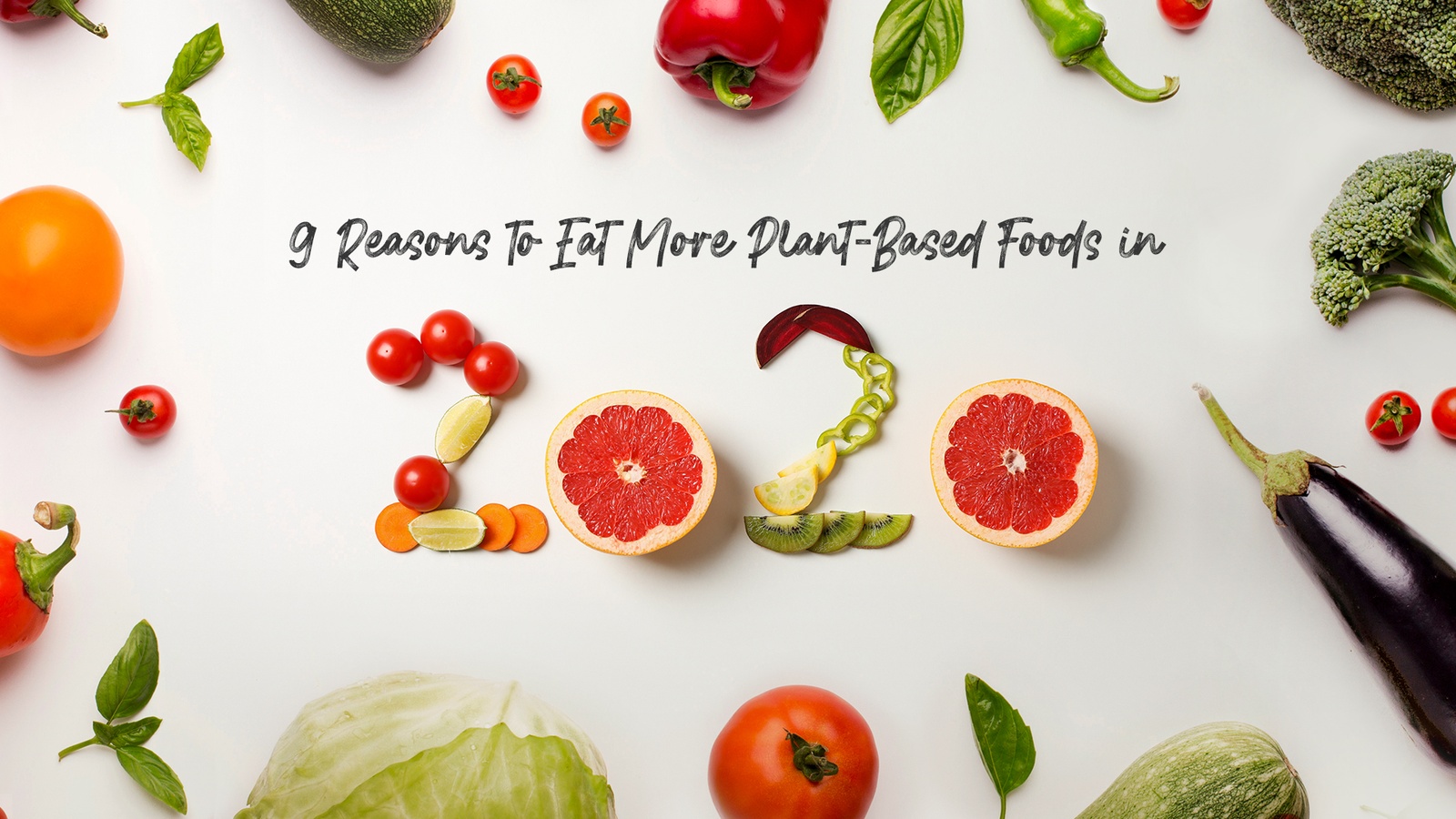9 Reasons to Eat More Plant-Based Foods in 2020
From cafes to celebrities, it seems everyone is jumping on board the plant-based food train and for very good reason. Whether you want to reduce the level of meat in your diet or go vegan, there are many benefits for having more plants and less meat for your health, the environment, animals and society as a whole.
When we talk about plant-based diets, we mean meals based primarily on whole vegetables, legumes, fruits, nuts, and grains, avoiding processed foods, and removing or limiting the amount of red meat, white meat, and dairy.
While it seems to be constantly growing in popularity online and in food stores, adopting a plant-based diet is more than just a trendy way to eat, it’s actually backed by scientific research.
A report compiled by a group of 30 food policy and nutrition scientists from around the world, published in the British medical journal The Lancet, recommends a largely plant-based diet, with small, occasional allowances for meat, dairy, and sugar for all nations. This would allow healthy diets that enable the growing population of the earth to be fed while managing factors such as greenhouse gas emissions, water, and crop use, land use and more.
Pouring over the research, while snacking on our favorite recipes, here are our top 9 reasons to go plant-based in 2020:
1. Adopting a plant-based diet can cut your carbon footprint by 50% or more
The resources it takes to produce one pound of beef is quite astonishing and contributes significantly to global warming, according to a major report by the UN’s Intergovernmental Panel on Climate Change.
15 pounds of grain are required to produce one pound of beef, and the amount of beef the average American consumes in a year creates greenhouse gases equivalent to driving a car 1800 miles. The grain grown to feed livestock takes up a lot of resources, less would be needed if we simply ate the grain ourselves.
Switching to a plant-based diet with just 2/3 of your weekly meals completely vegan could see your personal carbon footprint reduce by almost 60 percent, and on a strict vegan diet, this reduction could be up to 85%.
Some favorite vegan meals for any time of the year use local, seasonal ingredients to minimize food miles. Homemade pizzas, slow cooker soups, and everything-in-the-kitchen-sink curries are good ways to gulp down the freshest vegetables.
2. Save gallons of water
Huge amounts of water are needed to raise animals for food, just a fraction of that amount of water is required to grow plants and grains. In fact, nearly half of all the water used in the USA goes to livestock.
A typical meat-eater diet racks up 4,000 gallons of water per day in associated preparation and production, but only 300 gallons of water are used to produce a day’s food for a typical vegan.
In an article on the PETA blog, it explains that you could save more water by not eating a pound of meat than you would by not showering for six months.
Additionally, if you switched your daily tea to have oat milk instead of cow milk, and you had two cups per day, over a year you would save over 84,000 liters of water. That’s the equivalent of 108 showers of 8 minutes duration.
3. Lose weight
Plants are packed with nutrients, low in calories and high in fiber, helping you feel more full on less food, keeping your bowels regular and allowing your body to absorb the goodness with little effort.
Studies have shown that following a plant-based diet is effective in treating obesity, and those on a plant-based or vegan diet have the lowest average BMI (Body Mass Index).
Try our homemade oat milk recipe that promises to change the way you drink, while giving you creamy milk rich in plant-based vitamins and minerals.
4. Reduce inflammation
If you regularly eat meat, dairy, and processed foods, it’s highly likely you’ve got a lot of inflammation in your body due to the saturated fat and endotoxins in these products. Inflammation is the body’s response and a warning sign to you that there is something harmful that the body has encountered. It is helpful and necessary in the short-term, but long-lasting or chronic inflammation is not healthy and has been linked to a range of diseases.
Studies have shown that switching to a plant-based diet provides you with natural anti-inflammatory benefits to reduce your current inflammation. Plus, there are far fewer inflammatory catalysts present in fruit, vegetables, nuts, and seeds. Some of our favorites are green, leafy vegetables, almonds and walnuts, and olive oil - which all come together to make a beautiful salad.
5. More energy
As plants are easily digested and their nutrients quickly absorbed into the body, you can experience a fast injection of energy that lasts. Having more energy can improve your mental and physical health by enabling you to participate in more activities of your choosing. Instead of a block of chocolate, reach for one of these energy-boosting bliss balls for your afternoon pick-me-up.
6. Radiant skin
Eating a clean diet of whole grains, fruits, vegetables, nuts, seeds, and legumes not only has a great detoxifying effect to clear the skin but also provides incredible nutrients to see you heal and glow from the inside out. The nutrient boost of Vitamins C, E, and B-complex, Zinc, Copper and Selenium can help make hair shiny, skin clear and radiant, smooth wrinkles and protect your skin from the sun.
Avocado, a fruit rich in healthy fats and all the good vitamins, does wonders for both our hair and skin. Plus, it tastes just as good in smoothies and rice paper rolls as it does on toast!
7. Reduce cholesterol levels and risk of cardiovascular issues
Studies show that a plant-based diet is a remarkably effective dietary intervention in lowering plasma cholesterol concentrations. Results from case studies have shown results as dramatic as a 35% reduction in blood cholesterol levels when following a plant-based diet. This is predominantly due to the low amounts of saturated fat in plants and grains compared to meat.
With a growing global vegan population, there are now supermarket shelves of substitutes, but some of our favorite minces are made at home with lentils and mushrooms, or walnuts and cauliflower.
8. Reduce the risk of disease
Plant-based diets are a rich source of vitamins, minerals, fiber, protein and unsaturated fats that promote good health as well as reduce the risk of a number of serious diseases including obesity, heart disease, type 2 diabetes, chronic disease, and some cancers.
Large prospective trials have found that populations who follow plant-based diets, particularly vegetarian and vegan diets, are at lower risk of death from ischemic heart disease.
A study on the impact of diet and Type 2 Diabetes found that plant-based plant-based diets, especially when rich in high-quality plant foods, are associated with a substantially lower risk of developing Type 2 Diabetes.
Additionally, the American Cancer Society Guidelines on Nutrition and Physical Activity for Cancer Prevention promotes a diet that emphasizes plant-based food and avoidance of red and processed meat.
Luckily, there are delicious recipes such as this Chocolate Peanut Butter Healthy Heart Smoothie that use plant-based sources to deliver nutrients to one of our most vital organs.
9. Save money
Buying meat as part of your weekly shop can be quite expensive, and too so are medical bills that can follow a diet heavy in meat. Some may have a perception that healthy, plant-based or vegan food can be expensive. But if you make your meals at home from good individual ingredients rather than pre-packaged meat alternatives, you’ll find you’ve got spare cash at the end of each week, you might even want to treat yourself to an extra smoothie on the weekend!
Anything’s possible with a handful of vegetables and some fragrant herbs and spices, so use this as your catalyst to get creative in the kitchen.
Whether you choose to go plant-based for the environment, your health or for the wellbeing of animals, there’s plenty of great reasons that show you can make a positive change by choosing a plant-based way to eat.
Discover how to lose excess fat from your belly, face & thighs in less than 7 days with this simple ancient practice. Watch the Detox Masterclass here. Playing for a limited time!









